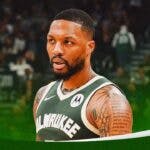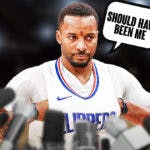The Portland Trail Blazers lost their fifth straight road game to open the regular season on Friday, falling to the LA Clippers 117-109 at Staples Center.
After the game, Chauncey Billups bemoaned his team's penchant for losing focus on defense away from the friendly confines of Moda Center, remarks echoed by Damian Lillard. The numbers, just like the eye test, support that criticism. The Blazers' 120.0 defensive rating on the road, per Cleaning the Glass, isn't just 30th in the league, but last by a wide margin. The Atlanta Hawks, 29th in road defensive rating, allow a whopping 3.6 points per 100 possessions fewer than Portland.
Even accounting for the lapses in execution and intensity brought up by Billups and Lillard, it stands to reason the Blazers' defense will get better on the road. Home opponents won't shoot 43% from deep all season even if the defense continues hemorrhaging corner threes and open looks elsewhere off penetration and quick-hitting ball movement. The overall quality of Portland's defense rests somewhere in the middle, likely closer to the bottom, of its dead-last defensive rating on the road and third-best defensive rating at home.
Billups seems keenly aware of his team's ceiling on that side of the ball. Pressed to explain the Blazers' struggles defensively after the Clippers—playing without Kawhi Leonard, remember—dropped a 120.6 offensive rating on Tuesday night, he copped to the realities of a team built around multiple score-first guards.
“This is not a roster that has six or seven lockdown guys, let's be honest about that,” Billups said.
The only players in Portland's rotation who've made their careers on defense are Robert Covington and Larry Nance Jr. They aren't All-NBA caliber defenders, either. Covington's declining foot speed has made him an outright liability at the point of attack, and Nance's versatility and switchability waxes and wanes depending on the matchup. Neither has been immune from mistakes away from the ball in the season's early going, especially damaging given their reputations as impactful, disruptive help defenders.
Jusuf Nurkic can be a major presence defensively, but will forever be limited by his mobility and conditioning. Nassir Little is still developing the mindset and understanding needed to be a nightly plus on that end, and Norman Powell—despite yeoman's work checking Paul George Tuesday night—is way overstretched as a primary stopper.
The Blazers' talent on defense clearly lags behind that of other teams with legitimate hopes of advancing deep into the playoffs. Billups believes he can mold them into a respectable defense anyway.
“But I also don't think that you need that. I think if you're locked into your schemes and to your principles, and everybody's really locked into it, you don't have to that have that,” he said of a defense-first roster. “You'll be fine. And we've shown that this year several times.”
Lillard and Powell made the same point after the game. Billups' aggressive defensive scheme, one that puts the onus more on the team than the individual, has been heartily embraced and endorsed by Portland. He tweaked that approach against LA on Tuesday, putting Nurkic and Cody Zeller in drop coverage on pick-and-rolls, and has relied more on zone defense and switching across five positions in small-ball lineups of late.
Just that variability alone should help the Blazers ultimately improve on their defense a year ago, which finished second-to-last ahead of the historically porous Sacramento Kings'. Being so reliant on a strong defensive string and in-game coverage changes, though, still leaves Portland susceptible to getting gashed in myriad ways more gifted defenses aren't.
Neil Olshey famously said in June that the Blazers' poor defense under Terry Stotts wasn't a result of the roster. For the second time in less than a week, Billups has gone on record stating the opposite.




